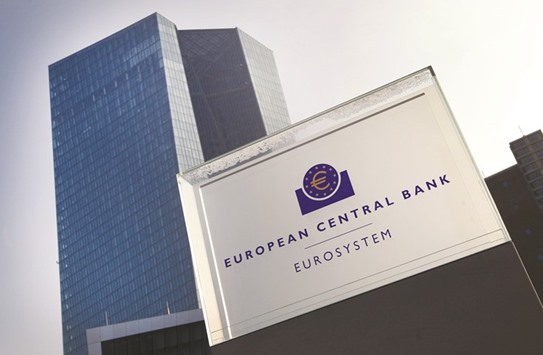The prospect of further stimulus is failing to reassure investors in Europe’s corporate-bond market.
Yields on investment-grade company notes are now higher than in June, when the European Central Bank first started buying the bonds, even though economists expect policy makers to announce an about six-month extension to stimulus efforts today. The sell-off instead reflects concerns about political instability in Europe, stoked by the resignation of Italian Prime Minister Matteo Renzi, coupled with expectations that Donald Trump’s spending plans will drive up interest rates in the US.
“The ECB’s bond buying isn’t a magic bullet for all of Europe’s ills,” said David Riley, who helps oversee $51bn of assets as head of credit strategy at BlueBay Asset Management in London. “That’s especially clear when political risk appears to be rising.”
The central bank will decide at a two-day meeting whether to prolong a €1.7tn ($1.8tn) purchase programme due to end in March, and if there will be any slowdown in bond- buying. The meeting comes as the region’s political leaders ready for elections in the Netherlands, France and Germany next year amid a wave of populism that has already helped topple leaders in the UK and Italy.
Concerns about European political stability, and the prospect of higher US interest rates, have outweighed the ECB’s purchase of about €48bn of corporate bonds. The notes had their worst month since June 2015 in November as part of a sell-off of euro assets. The single currency has fallen about 3% since Trump’s surprise November 8 election, while yields on German 10-year bonds are near the highest since January.
Almost all economists surveyed by Bloomberg expect the ECB to extend its bond-buying programme beyond March, and most foresee an extension of about six months at the current pace of €80bn a month. The buying, which encompasses a range of assets including sovereign and corporate bonds, is intended to help spur inflation and growth.
If the ECB announcement fails to meet expectations, any sell-off will most likely hit the investment-grade market, about 30% of which is bank debt, said Mary Pieterse-Bloem, the global head of fixed-income strategy and portfolio management at ABN Amro Private Banking, which oversees approximately €190bn of assets.
“Banks are now in a softer spot than where they were before the Italian referendum,” she said. “So, if the ECB is going to build up expectations and then disappoint you will see it in the investment-grade spreads for sure.”
The premium for investment-grade corporate notes versus government securities has risen to as high as 127 basis points this month, the same level as before the ECB started buying the bonds in June, according to Bloomberg Barclays index data. It’s still below the year-to-date high of 167 basis points set in February.
The bonds had a loss of 1.1% last month, the index data show. They lost a further 0.4% in the first four days of December, partly because of Renzi’s resignation following a defeat in a referendum on Italian constitutional reforms. Investors also pulled $1bn from European investment- grade funds in the week to November 30 in the fourth straight week of outflows, according to a Bank of America Corp report citing EPFR Global data. They withdrew $353mn from high-yield funds in the fifth week of outflows, the data show.
Those trends suggest ECB purchases are having a diminishing impact on the corporate-bond market, said Luke Hickmore, a senior investment manager at Aberdeen Asset Management, which oversees about $380bn.
“The ECB is getting less bang for its buck,” he said. “It’s one of the signs that monetary policy might be starting to reach its limits.”

The headquarters of the European Central Bank is seen in Frankfurt. The central bank will decide at a two-day meeting starting today whether to prolong a $1.8tn purchase programme due to end in March, and if there will be any slowdown in bond-buying.
